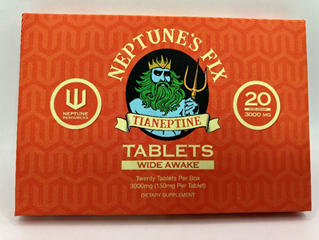THURSDAY, Jan. 25, 2024 (HealthDay News) — Reiterating a warning first issued in November, the U.S. Food and Drug Administration is urging Americans to stay away from supplements containing tianeptine, known on the street as “gas station heroin.”
The supplements, sold under the brand name Neptune’s Fix online and at gas stations and convenience stores, can cause seizures, unconsciousness and even death.
“FDA is warning consumers not to purchase or use any Neptune’s Fix products, or any other product with tianeptine — a potentially dangerous substance that is not FDA-approved for any medical use but is illegally sold with claims to improve brain function and treat anxiety, depression, pain, opioid use disorder and other conditions,” the agency said in its November statement.
Updating that warning on Wednesday, the FDA said it “continues to receive severe adverse event reports after use of Neptune‘s Fix products.”
According to the U.S. Centers for Disease Control and Prevention, tianeptine is an antidepressant used in Europe, Asia and Latin America, but it has never been approved for any medical use in the United States.
“Several case studies have reported severe adverse effects and even death from recreational abuse of tianeptine,” the CDC said.
Neptune Resources LLC, the maker of the products, “has agreed to voluntarily recall all lots of Neptune’s Fix Elixir, Neptune’s Fix Extra Strength Elixir and Neptune’s Fix Tablets,” according to the FDA. The agency also sent notices on Jan. 11 to convenience stores, gas stations and other retailers to stop selling the products.
It’s not just the active ingredient tianeptine that worries the FDA.
“Neptune’s Fix labels state the product contains tianeptine, but the product may contain other harmful ingredients not listed on the label,” the agency said.
Also, “these products may interact, in life-threatening ways, with other medications a consumer may be taking,” the agency added.
Speaking with NBC News, Dr. Pieter Cohen, an associate professor at Harvard Medical School, called the threat from tianeptine another sign of weak oversight of dietary supplements in this country.
Dietary supplements do not have to undergo FDA approval nor are they tested for safety or effectiveness.
The FDA’s “tools are extremely limited,” said Cohen, who studies the regulation of supplements. “They’re basically in a situation where they need to ask the company politely if they can take if off the market.”
Help may be at hand from Congress, however: On Jan. 18, five members of Congress sent a letter to FDA Commissioner Dr. Robert Califf urging more action on tianeptine.
The drug “has opioid-like qualities and is extremely addictive. We urge the FDA to take immediate action to research and provide guidance on tianeptine use,” the legislators wrote.
More information
There’s more on tianeptine at the CDC.
SOURCES: U.S. Food and Drug Administration, news releases, Nov. 21, 2023, and Jan. 11, Jan 23; NBC News; Congressional letter
Copyright © 2026 HealthDay. All rights reserved.

